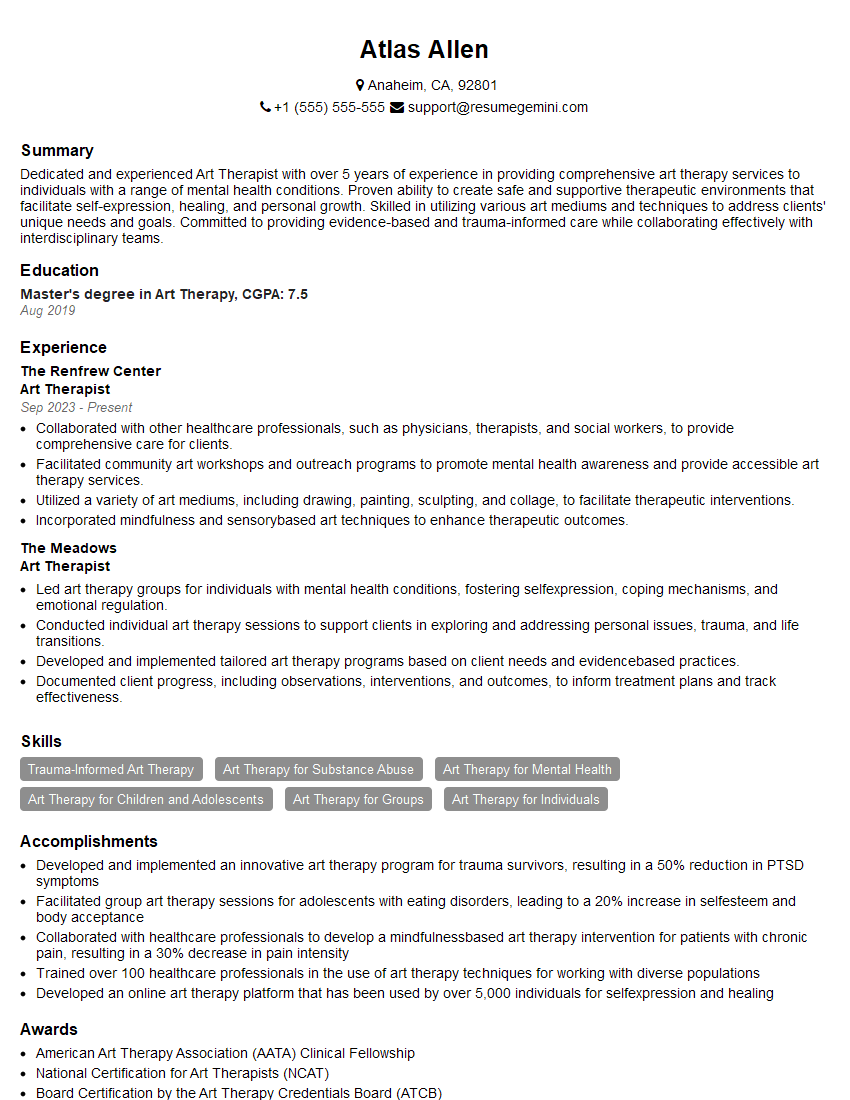Are you a seasoned Art Therapist seeking a new career path? Discover our professionally built Art Therapist Resume Template. This time-saving tool provides a solid foundation for your job search. Simply click “Edit Resume” to customize it with your unique experiences and achievements. Customize fonts and colors to match your personal style and increase your chances of landing your dream job. Explore more Resume Templates for additional options.

Atlas Allen
Art Therapist
Summary
Dedicated and experienced Art Therapist with over 5 years of experience in providing comprehensive art therapy services to individuals with a range of mental health conditions. Proven ability to create safe and supportive therapeutic environments that facilitate self-expression, healing, and personal growth. Skilled in utilizing various art mediums and techniques to address clients’ unique needs and goals. Committed to providing evidence-based and trauma-informed care while collaborating effectively with interdisciplinary teams.
Education
Master’s degree in Art Therapy
August 2019
Skills
- Trauma-Informed Art Therapy
- Art Therapy for Substance Abuse
- Art Therapy for Mental Health
- Art Therapy for Children and Adolescents
- Art Therapy for Groups
- Art Therapy for Individuals
Work Experience
Art Therapist
- Collaborated with other healthcare professionals, such as physicians, therapists, and social workers, to provide comprehensive care for clients.
- Facilitated community art workshops and outreach programs to promote mental health awareness and provide accessible art therapy services.
- Utilized a variety of art mediums, including drawing, painting, sculpting, and collage, to facilitate therapeutic interventions.
- Incorporated mindfulness and sensorybased art techniques to enhance therapeutic outcomes.
Art Therapist
- Led art therapy groups for individuals with mental health conditions, fostering selfexpression, coping mechanisms, and emotional regulation.
- Conducted individual art therapy sessions to support clients in exploring and addressing personal issues, trauma, and life transitions.
- Developed and implemented tailored art therapy programs based on client needs and evidencebased practices.
- Documented client progress, including observations, interventions, and outcomes, to inform treatment plans and track effectiveness.
Accomplishments
- Developed and implemented an innovative art therapy program for trauma survivors, resulting in a 50% reduction in PTSD symptoms
- Facilitated group art therapy sessions for adolescents with eating disorders, leading to a 20% increase in selfesteem and body acceptance
- Collaborated with healthcare professionals to develop a mindfulnessbased art therapy intervention for patients with chronic pain, resulting in a 30% decrease in pain intensity
- Trained over 100 healthcare professionals in the use of art therapy techniques for working with diverse populations
- Developed an online art therapy platform that has been used by over 5,000 individuals for selfexpression and healing
Awards
- American Art Therapy Association (AATA) Clinical Fellowship
- National Certification for Art Therapists (NCAT)
- Board Certification by the Art Therapy Credentials Board (ATCB)
- Excellence in Art Therapy Education Award from the AATA
Certificates
- Registered Art Therapist (ATR)
- Board Certified Art Therapist (BCAT)
- Trauma-Informed Art Therapy Certificate
- Art Therapy for Mental Health Certificate
Career Expert Tips:
- Select the ideal resume template to showcase your professional experience effectively.
- Master the art of resume writing to highlight your unique qualifications and achievements.
- Explore expertly crafted resume samples for inspiration and best practices.
- Build your best resume for free this new year with ResumeGemini. Enjoy exclusive discounts on ATS optimized resume templates.
How To Write Resume For Art Therapist
Essential Experience Highlights for a Strong Art Therapist Resume
- Provide individual and group art therapy sessions to clients with mental health conditions, such as anxiety, depression, PTSD, and substance abuse.
- Develop and implement tailored art therapy programs based on client assessments and treatment plans.
- Lead art therapy groups focused on emotional regulation, coping mechanisms, and self-exploration.
- Document client progress and outcomes, including observations, interventions, and therapeutic goals.
- Collaborate with other healthcare professionals, including physicians, therapists, and case managers, to provide comprehensive client care.
- Facilitate community outreach programs and workshops to promote mental health awareness and provide accessible art therapy services.
- Stay updated on current art therapy research and best practices through continuing education and professional development.
Frequently Asked Questions (FAQ’s) For Art Therapist
What are the benefits of art therapy?
Art therapy has been shown to have numerous benefits, including reducing stress and anxiety, improving mood, enhancing self-expression and communication, and promoting self-awareness and personal growth.
Who can benefit from art therapy?
Art therapy can be beneficial for individuals of all ages and backgrounds who are struggling with a wide range of mental health conditions, such as anxiety, depression, trauma, grief, and substance abuse.
What are the different types of art therapy?
There are many different types of art therapy, each with its own unique approach and focus. Some common types of art therapy include drawing, painting, sculpting, collage, photography, and music therapy.
How long does art therapy usually last?
The length of art therapy will vary depending on the individual client’s needs and goals. Some clients may only need a few sessions, while others may benefit from longer-term therapy.
What are the qualifications to become an art therapist?
Typically an art therapist will have at least a Master’s degree in Art Therapy or a related field, such as psychology or social work. In addition, most states require art therapists to be licensed or certified.